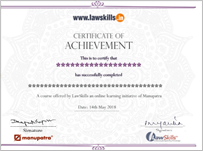Have general questions about LawSkills? You can find helpful information on LawSkills in our FAQ section.
Have a question about something specific? Contact LawSkills’ General Support Team directly for a quick and efficient response:
Please note: The LawSkills Support Team will address your queries in English. While we will do our best to address your enquiry in any language, our responses will be in English.
| Serial No. | Course Name | Text |
|---|---|---|
| 1 | General | Launch of LawSkills on 28th June 2017 |
"The biggest risk is not taking any risk... In a world that’s changing really quickly, the only strategy that is guaranteed to fail is not taking risks."
-Mark Zuckerberg
Unforeseen events take place every day and in many unexpected means- be it the 2008 global economic crisis, the natural disasters like tsunamis, earthquakes, or the political uprisings. At the organizational level, the common outcomes of these unexpected events have been the loss of the workforce, ruined operations, damaged IT infrastructure, deficit in the cash flow etc.
The markets favor the risk takers. This notion, however, should not be construed to mean that one puts at stake their prospects of success. It is through calculated risks; founded on a comprehensive understanding of your organization’s inclination towards risks and the safeguard mechanisms that success is ensured.
The essential question is how do you facilitate your leadership to achieve this goal? Of course, the answer lies in a productive and robust Enterprise Risk Management (ERM) Agenda which forms part of the business strategy of the firm itself. While we cannot predict the “risks” with absolute certainty, what we can do is be “proactive” and “better prepared” so as to respond better faster. In other words, from a shareholder’s perspective an enterprise needs to examine how well its core business strategy will perform under different unexpected scenarios and events.
This course addresses all the major ERM activities: from risk framework to risk governance, identification monitoring and mitigation. It aims to provide a blend of academic and practical ERM approach based on the integration of ERM with value-based strategic planning and decision-making. The goal is to provide a holistic coverage of a range of current ERM practices together with answering the question on how to manage risk strategically in all its dynamic complexity. The Course also offers an examination of the areas critical to an organization’s success from a strategic, operational and financial perspective; and evaluates the steps required for managing strategic risk. It also examines why many companies fail in spite of the vast knowledge of factors driving success.
After completing this course, you will be able to:


Level: Beginners
Language: English
Duration: 6 Months
EVALUATION METHOD
Progress will be tested by way of quizzes and assignments at the end of each Module. Learners must attempt the exam at the end of the course and secure at least 50% marks to obtain course certificate.
Lawskills.in is now manupatracademy.com
For any queries write to us at academy@manupatra.com
This course page is for informational purposes only. We are **no longer accepting new registrations on this website.**
Please click the button below to be redirected to our new, official enrollment platform:
Go to New Registration Site| S.No. | Title | Date | File | Edit | Delete |
|---|


